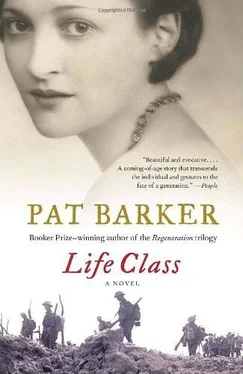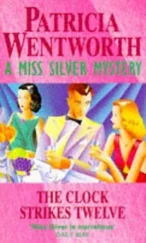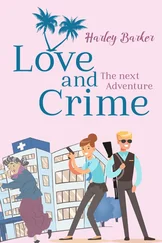‘What we really need to do is operate sooner. Very few of them, you know, are on the operating table within twenty-four hours — that’s what we need to look at. You can pour hydrogen peroxide and carbolic into the wound till you’re blue in the face, but if the infection’s well established you’re not going to shift it that way. Browne was saying, in the Boer War he’d seen men with terrible injuries — sometimes they’d lain out in the veldt for days with no medical attention whatsoever and yet they survived. But that was on sand. You know, everybody talks about machine guns and shells, but it’s not bullets and shrapnel that are killing the men in there. It’s the soil.’
‘So what can you do?’
‘What can I do?’
‘No, generally.’
‘Turn the Casualty Clearing Stations into theatres. At the moment they just patch them up to get them here, but that’s no use. You’ve got to do the surgery there. Excise the wound. And if a shell lands on your head while you’re doing it, too bloody bad. As to what I can do … Oh, God knows. Get out of here.’
‘Why?’
Burton looked surprised. ‘It’s not much fun, you know, day after day doing amputations, when you know they could have been avoided.’
‘So what would you do?’
‘Research, I suppose. There’s got to be something we can do that’s better than pouring hydrogen peroxide into a wound. Or I could join the army, but then I risk getting stuck in a base hospital. They might think I’m too old for the front line’
‘And the whole point is to get to the front?’
‘Oh, yes. A base hospital would drive me mad.’ He looked into his mug as if he suspected it of emptying itself. Ah, well, better be getting back.’
Paul was unsettled by this conversation, and not merely because applying hydrogen peroxide to an infected wound now seemed pointless as well as unpleasant. Burton was thinking about the war and how he could best make a contribution. He saw alternatives. Paul had been plodding along like a donkey for weeks. Now and then something would catch his eye and he’d reach for a drawing pad, but that was as natural and unreflective as breathing. He hadn’t allowed himself to think how long his present way of life would go on.
The next two hours were busy. He went round the ward, dispensing sleeping powders, fetching bedpans, straightening sheets, taking round the bedtime cocoa. The tattooed man lay still. The other patients drank their cocoa and one by one slipped into a drugged sleep. The guns were loud, rocking the water in the glasses by each bed.
At last the ward settled down. Paul’s eyelids were drooping. The change from day to night duty was always hard until the body adjusted. He filled in the hourly record, summoned Sister Roper to give a morphine injection, changed the sheets on a bed where a patient had vomited coming out of the anaesthetic, and then sat for a while with his head in his hands, his mind simultaneously blank and busy.
When he looked up, Lewis was sitting by one of the beds. At first he thought he must be hallucinating: Lewis ought to be asleep in the hut, but, no, there he was. It would have been natural to go and ask him what he wanted, but something made Paul hold back. He recognized the patient now. It was the suicide, the one who’d fought them all the way to the operating table and when he recovered faced a firing squad. Now and then his head jerked and he shouted out. The other patients, dragged out of their heavy, drugged sleep, yelled at him to shut up.
What on earth did Lewis think he was doing? What could he hope to achieve, without even a language in common? Still he sat there. An hour, two hours. Eventually Paul made tea and took it across to him. He started to say, ‘You know you shouldn’t be here, don’t you?’ but then stopped. Lewis was drenched in sweat. Not the light sweat that follows exercise, but a drenching that darkened his shirt and made it stick to his chest. His skin was white under the golden-brown freckles. Even his eyes looked paler than usual.
‘I think he’ll sleep now,’ he said, taking the cup.
Over the next few nights Paul became steadily more aware of Lewis’s obsession with the suicide, whose name was Goujet though nobody ever used it. Lewis would arrive at the beginning of the night shift and sit with him, and again at the end. Nobody else paid Goujet any attention. The truth was his presence depressed them. The patients resented him because he was noisy and demanding and because he had tried to escape from circumstances that they had also found unbearable, and gone on bearing. The staff resented having to nurse somebody back to health in order for him to be shot. Obviously this might be the fate of many of the patients, but only on the battlefield. It was the firing squad that made the irony of their efforts inescapable.
Goujet lay with one eye closed and the other, blind eye, wide open. As the hours passed this eye seemed to shrink deeper into its socket, to become small, white and shrunken. The sun in winter looked like that seen low in the sky over frosty fields. It was hard to walk past the bed and not meet this eye that stared out oblivious to your presence. In his rare moments of clear consciousness he seemed full of hate, though he never said anything, not even beyond the few mangled words he spat at them whenever they tried to get him to eat. He wouldn’t take food. If he accepted water it was only a couple of sips, and then he’d turn his head away.
Lewis would sit beside him, clasping his wrist. At first Goujet struggled to free himself, but then abandoned the attempt, though more from weakness, Paul thought, than because he found the contact acceptable. Something had to happen to stop this. If he’d noticed this then Sisters Byrd and Cope would certainly have noticed it too.
One day as he was going off duty, Paul was asked to go to Sister Byrd’s room. This room was really no more than a little cubbyhole off the boiler room, but she’d made it comfortable. She had her tea, her cocoa, a tin of biscuits, a kettle and a blue-and-white mug with a painting of Edinburgh Castle on the side. Paul waited. He guessed what was coming and resented it. Was he Lewis’s keeper? Evidently he was. Somehow or other this had been decided, though whether by accident — because the only vacant bed happened to be in his hut — or because Sister Byrd thought she discerned in him a particular talent for lowering new arrivals gently into scalding water, he didn’t know. He only knew nobody had consulted him.
‘Come in, Paul.’ She had a deceptively gentle Scottish accent that made him think of pale spring sunshine on grey granite terraces. ‘Sit down.’
She poured hot water from the kettle on to the cocoa in their mugs.
She was … what, fifty? Something like that. A professional nurse with several decades of experience in civilian hospitals, unlike many of the other nurses who were really lady-volunteers with minimal qualifications. She wore her professional status like an external corset. Unbending, efficient, detached, halfway to being a monster, perhaps, but she got the job done.
She sat down facing him. ‘How do you think Lewis is settling in?’
‘All right, I think. It’s early days.’
‘Yes,’ she agreed, a little too quickly. ‘I hope he’s not getting over-involved?’
He waited.
‘With the man who tried to kill himself
‘I don’t know.’
‘He sits with him a lot, doesn’t he?’
‘Yes, I believe he does.’
‘You know I’ve had to tell him to go off duty once or twice. And he comes in on his day off.’
‘He’s young. He’ll get over it.’
‘It’s so easy to let the work here grind you down. If he goes on like this he’ll be no use to anybody in a month’s time. I was hoping you might have a word with him, and … I don’t know. Get him away from the hospital. I don’t want to see him on the wards on his day off. Get him out, show him the country.’
Читать дальше












